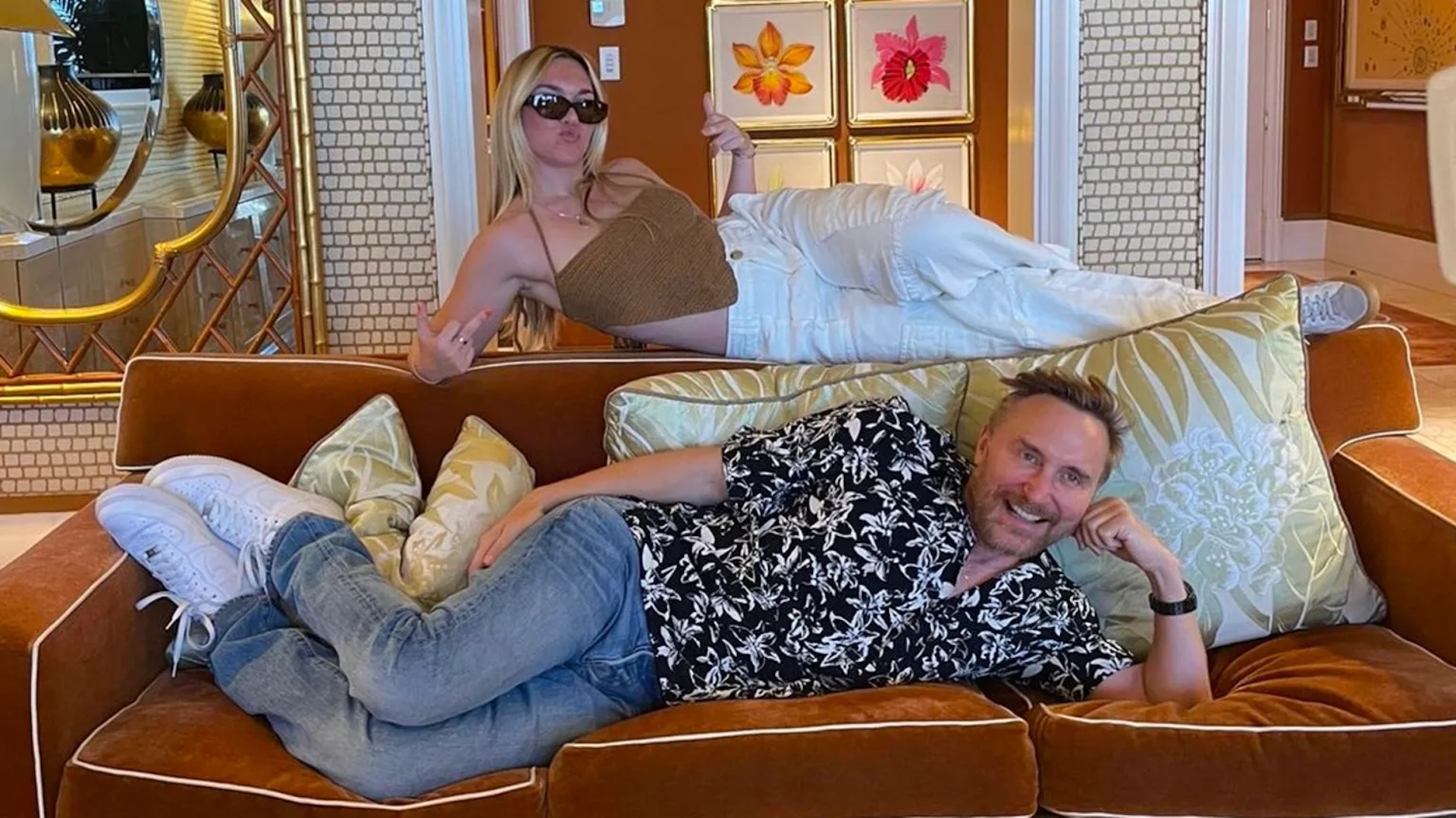There are a couple of unconventional contenders for Song of the Summer, including the slow jam from Summer House’s number one break-out star, Jesse Solomon. If you’ve had time between repeats of “What Would Jesse Solomon Do” to scroll on TikTok, you‘ve likely heard the overnight internet sensation “Man in Finance.” Girl On Couch (not a horrible stage name, all things considered) cooked up the silly lyrics about wanting a 6’5″ finance boy with green eyes and a trust fund to sweep her off her feet. Extremely relatable content if you can stomach hearing the words “mergers and acquisitions” in bed. But the viral TikTok sound gained so much traction from brands and DJs across the globe that it’s snowballed into a Billboard-certified hit in the making.
Good for her, right? Maybe with all the money she stands to make from the song, she can follow Cher’s lead and be her own man in finance. But TikTok sleuths (truly capable of investigating anything) wonder if Megan Boni signing a short-term record deal is in her best interest. They’ve started a conversation about songwriters’ predatory experience in the industry as a whole and how TikTok has revolutionized the art of making music. So what is the deal with Girl On Couch’s “Man in Finance” record deal? Let’s unpack.
Did Girl On The Couch get a record deal?
@amandalehaf 🙄 the music industry can be sooooo toxic and screws over so many people!! Be smart with your IP 🥲 #musicindustry ♬ original sound – Amanda LeHaf
Yes, but it’s not exactly the typical agreement we’re used to hearing horror stories about, as alluded to in the TikTok above. Creator Amanda LeHaf expressed big concerns for Girl On Couch after hearing about the initial news of her record deal, assuming it came with a hefty advance that often leaves artists in serious growing debt that’s difficult to pay back with profits from their songs if they don’t perform at an extremely high level (see: the entire Kesha saga).
It turns out Megan Boni actually entered a one-time licensing and distribution deal with Capital Records and signed new music management with Amanda Rovitz, a college friend she met while studying abroad (who says getting drunk in Europe doesn’t pay off?). This type of deal is specific to a particular song, where the label has permission to license the rights to “Man in Finance” to other artists hoping to sample the track (of which there are many, including David Guetta) for their own legitimate streaming hits (as opposed to remixes on TikToks). They perform this middle-man service for a fee, which means Boni is losing a slice of the pie with the expectation that the payout with Capital’s help will be larger. It’s hard to know the financial breakdown and whom it benefits most since the exact deal terms are currently under wraps.
@arldesignconsulting Understanding the Licensing Deal that Girl On Couch signed & what you can do if you ever find yourself in a similar situation! @Amanda LeHaf x ARL #arl #musicindustry #recorddeal #licensingdeal #viral ♬ original sound – Amanda | ARL DESIGN&CONSULTING
In a follow-up video on her business account, music industry expert Amanda LeHaf clarifies that even this kind of one-off deal can be tricky for vulnerable artists with one viral hit song they’re investing a lot of hope into. While Amanda makes clear she is not privy to the terms of Girl On Couch’s contract, she uses lots of big words to explain that when music industry deals (no matter the specific type) involve shoving large sums of money into inexperienced artists’ hands, whether in the form of an upfront fee or loan-style advance, it can lead to debt or unfair loss of potential profits, in the long run, had the artist stayed independent. It’s scarily easy to lose sight of bigger picture items like royalties splitting, the creative authority over who the song is licensed to, and how long the label has effective ownership of the song that TikTokers might not think about before quitting their day job.
@girl_on_couch #stitch with @Amanda LeHaf ♬ original sound – Girl On Couch
Girl On Couch apparently did not appreciate the educational trip down the music industry’s lane, FWIW. She commented “leave me alone” on Amanda’s follow-up and stitched it (using a questionable southern accent) to say she, of course, has an entertainment lawyer, so why is this “little girl…all up in her grill?” Welp! I guess that settles that, at least for now.
Jon Bellion Speaks On Record Labels Preying On Songwriters
@thegeorgejankoshow One of the most highly anticipated episodes of the year is FINALLY here… The @Jon Bellion interview. Out Now! #jonbellion #musicartist #producer #georgejankoshow #fyp ♬ original sound – The George Janko Show
While Megan Boni may be satisfied with her deal, fan reactions to final bosses of the music industry pouncing on viral young artists raise some interesting questions. Jon Bellion became a star to watch in 2016 when he dropped the mega-hit “All Time Low” and the associated cult classic record The Human Condition. He also wrote hits like Eminem and Rihanna’s “Monster” and Justin Bieber’s high-key bop “Ghost.” Clips of Jon’s recent appearance on George Janko’s podcast have blown up on TikTok, where he discusses why he almost quit the music industry after two beloved studio albums. According to Jon, his touring deal with LiveNation (which he has since paid himself out of) came with a lot of strings he wasn’t made aware of.
After being advanced a million dollars, which he was stoked about at the time, he was stunned to learn it would take him far more shows than he originally anticipated to pay it back. Jon explained that, in his experience, the artist can only pay back debt through what he calls “hard ticket sales.” Meanwhile, concert venue owners, like LiveNation, make major bucks from everything to do with the concert (like overpriced parking and all those $50 watered-down cocktails you regret drinking the next morning). Jon and other musicians say this cash is unfair to exclude from artists’ revenue. Sometimes, selling out an arena still wasn’t enough to say “out of the red” because, as Jon noted, surprise flash ticket sales organized by his contract owners would further cut into his potential profit.
During his tour, Jon was confused about why there was always so much food and toilet paper constantly being shipped. Even though complaining about too much pizza feels like a lie, he explained he later learned there was a required minimum spend on catering and housekeeping for the tour, which were added to his tab. Finding all of this out about his tour deal opened Jon’s eyes to the no flex zones of his recording and publishing contracts, which sent him into a mental breakdown. When George asked the obvious question (why didn’t Jon look into all of this before he signed), Jon had a heartbreaking answer: he was a young neighborhood Italian kid who thought the first $10,000 from his publishing deal would keep him rich forever. It’s easy to fall prey to powerful people offering “more money than you’ve ever seen in your life” when you’re eating ramen for breakfast, lunch, and dinner. Small deals entered in good faith can spiral into big problems.
During his tour, Jon was confused about why there was always so much food and toilet paper constantly being shipped. Even though complaining about too much pizza feels like a lie, he explained he later learned there was a required minimum spend on catering and housekeeping for the tour, which were added to his tab. Finding all of this out about his tour deal opened Jon’s eyes to the no flex zones of his recording and publishing contracts too, which basically sent him into a mental breakdown. When George asked the obvious question (why didn’t Jon look into all of this before he signed) Jon had a heartbreaking answer: he was a young neighborhood Italian kid who thought the first $10,000 from his publishing deal would keep him rich forever. It’s easy to fall prey to powerful people offering “more money than you’ve ever seen in your life” when you’re eating ramen for breakfast, lunch, and dinner. Small deals entered in good faith can spiral into big problems.
TikTok is taking over the music industry

TikTok basically has the music industry in a chokehold when it comes to becoming an artist and promoting music. New creators are turning internet fame into mainstream success overnight more and more often, like Girl On Couch or Ashnikko. TikTok has inadvertently become the perfect free marketing tool to get your voice out into the world (if the FYP algorithm is on your side). Even established artists are leaning on social media when traditional streaming just isn’t fast enough. (For example, the recent Kendrick vs. Drake beef, in which many of the songs didn’t make it to Spotify.) Every label out there is begging its stars to try to crack TikTok, but there’s still something organic and unpredictable about the app that rejects the normcore approach to music (sorry, Justin Timberlake). Suppose you can become a star on TikTok or be a star who figures out how to engage your fan base there. Is there a world where cutting out the middle man to monetize your art as an independent creator might be seriously profitable? I’m sure that’s the question that has record labels shaking in their boots with the fur at this very moment.




















































